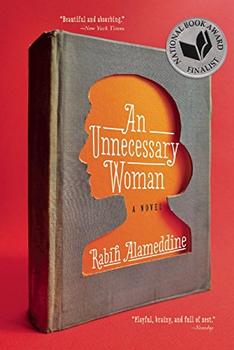Summary | Excerpt | Reviews | Beyond the Book | Readalikes | Genres & Themes | Author Bio

Critics' Opinion:
Readers' Opinion:
First Published:
Feb 2014, 320 pages
Paperback:
Nov 2014, 304 pages
 Book Reviewed by:
Book Reviewed by:
Naomi Benaron
Buy This Book
Excerpt
An UnnecessaryWoman
My father named me Aaliya, the high one, the above. He loved the name and, I was constantly told, loved me even more. I do not remember. He passed away when I was still a toddler, weeks before my second birthday. He must have been ill, for he died before impregnating my mother with another, as he was supposed to, expected to, particularly since I was female and first. My country in the late 1930s was still trying to pull itself out of the fourteenth century. I'm not sure if it ever succeeded in some ways. My father was barely nineteen when he married and twenty-one when he died, my mother a widow at eighteen. They were supposed to spend aeons together. It was not to be.
What to do with a young widow? The families convened. My mother's family, having thought they had one fewer mouth to feed, now had two more. It is said that my maternal grandfather hinted that they were given a defective model. The families decided that the young widow would be married off to her husband's brother and try once more, except she wouldn't receive a second dowry, her wedding gift. Three months after my father passed away—a threemonth canonical period—my mother knelt obsequiously before a sheikh and watched as her father and second husband signed the contracts.
In time I was presented with five half siblings, none of whom I was particularly close to. Six children, one room, three narrow, lumpy mattresses on the floor; horizontal martial arts battles during the night, yawning bruised bodies in the morning.
My uncle-father was kind, if not particularly loving or affable. He paid little attention to his children, even less to me. I'm unable to recall much about him. I have no pictures of him, so in my memory his face is always obscured. In every evocation of a childhood scene, my stepfather's face is the least detailed, the most out of focus; when I think of him my memory's eyes have cataracts.
His sole remarkable trait was his unremitting passing of gas, which he had no inclination to control. Lunches and dinners, as the family sat on the floor surrounding him, were unbearable. The boys loved it, but I could barely eat after he broke wind. That's probably why I've been skinny all my life. To this day, there are certain human smells that make my stomach swirl.
At his deathbed, on a night drunk with cicadas, as the family sat in his room, he called on each of his children to offer final wisdom, but he forgot to call on his youngest daughter or me. The youngest was devastated, and all tried to comfort her. They surrounded her, cooed to her, smothered her with mollifying maxims, passed her their handkerchiefs. I wasn't distressed and none comforted me. No one passed me a handkerchief, not even a tissue. He had no wisdom to offer me; no one in my family did.
I am my family's appendix, its unnecessary appendage.
I was married off at sixteen, plucked unripe out of school, the only home I had, and gifted to the first unsuitable suitor to appear at our door, a man small in stature and spirit. Marriage is a most disagreeable institution for an adolescent. We moved into this apartment and it took fewer than four years for him to stand before me, as the law required, and declaim the most invigorating of phrases: "You are divorced." Nothing in our marriage became him like leaving it.
The impotent insect stepped out the door, and these floors never had to feel his feet again. Young as I was, I shed not a tear. I did what my nature demanded. I cleaned and scrubbed and mopped and disinfected until no trace of him remained, no scent, not a single hair, not a touch. I removed the nails on the wall where he used to hang his dirty hat and his pungent pipes that he thought made him distinguished. With a needle and spool of thread I repaired every hole in the doilies singed by the cinders of his pipe. I soaked the mosquito net in bleach.
Excerpted from An Unnecessary Woman by Rabih Alameddine. Copyright © 2014 by Rabih Alameddine. Excerpted by permission of Grove Press. All rights reserved. No part of this excerpt may be reproduced or reprinted without permission in writing from the publisher.




Children are not the people of tomorrow, but people today.
Click Here to find out who said this, as well as discovering other famous literary quotes!
Your guide toexceptional books
BookBrowse seeks out and recommends the best in contemporary fiction and nonfiction—books that not only engage and entertain but also deepen our understanding of ourselves and the world around us.